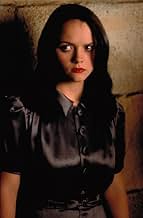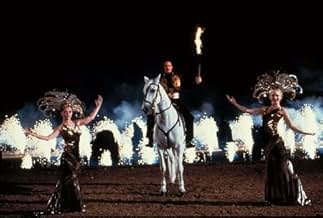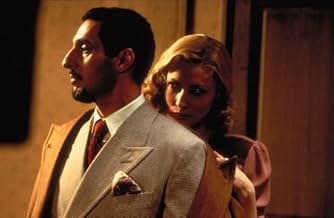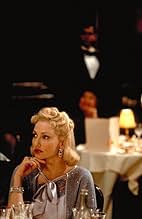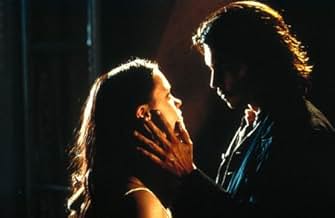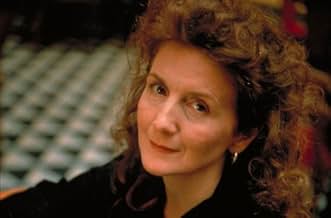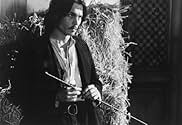ÉVALUATION IMDb
6,1/10
17 k
MA NOTE
Une jeune réfugiée relie la Russie à l'Amérique pour rechercher son père disparu. En chemin, elle tombe amoureuse d'un cavalier gitan.Une jeune réfugiée relie la Russie à l'Amérique pour rechercher son père disparu. En chemin, elle tombe amoureuse d'un cavalier gitan.Une jeune réfugiée relie la Russie à l'Amérique pour rechercher son père disparu. En chemin, elle tombe amoureuse d'un cavalier gitan.
- Director
- Writers
- Stars
- Prix
- 3 victoires et 3 nominations au total
Avis en vedette
First of all, try to avoid the trailer before watching the movie if you can. The Man Who Cried is about a young Jewish girl living in Russia in the late twenties who has to flee her home country and eventually ends up in Paris as a young adult just before the onset of World War II. She gets involved with a cabaret showgirl played by Cate Blanchett, an Italian opera singer played by John Turturro and a gypsy man played by Johnny Depp. I found the movie slow-moving but not boring. It had a certain melancholy to it where almost everything was restrained and understated. There are dramatic moments but no big melodrama which honestly I kinda missed. I wasn't particularly touched nor did I cry or even get teary-eyed. Your own mileage might vary, but I don't think it's a big tear-jerker.
There's a lot of music (mostly opera but not usually the bombastic cliché kind) in this film with two important recurring songs. They're quite beautiful especially the french song "Je crois entendre encore" which weirdly I didn't recognize as French despite it being my native language. The songs are important because they often convey the emotions felt instead of words. It doesn't really matter that you don't understand the words. As an historical drama, it mostly skirts big events, mostly focusing on their effects on our characters from different nationalities. You need some minimal historical background to get what is happening. The whole first part with the exile of the little girl was pretty gripping. She seemed so small and vulnerable. The romantic aspect was two-fold. The relationship between Cate Blanchett and John Turturro's characters was very interesting but not romantic. The relationship between Christina Ricci and Johnny Depp's characters was less interesting but more romantic.
Johnny Depp doesn't say much but his presence is felt. He was born to play sexy gypsy men and I suspect most women will "swoon" over him ;) The other performances were fine with the stand-out being Cate Blanchett as a somewhat superficial Russian dancer trying to marry into richness. The songs were mostly lip-synched. I think they were done very well but still it disturbed somewhat my suspension of disbelief. In conclusion, I liked watching it, it was well made with strong actors but the story could have been told a little better to engage the viewer more emotionally. It didn't strike me as particularly memorable or as the highlight of any of these actor's resumes.
Rating: 6.5 out of 10 (good)
There's a lot of music (mostly opera but not usually the bombastic cliché kind) in this film with two important recurring songs. They're quite beautiful especially the french song "Je crois entendre encore" which weirdly I didn't recognize as French despite it being my native language. The songs are important because they often convey the emotions felt instead of words. It doesn't really matter that you don't understand the words. As an historical drama, it mostly skirts big events, mostly focusing on their effects on our characters from different nationalities. You need some minimal historical background to get what is happening. The whole first part with the exile of the little girl was pretty gripping. She seemed so small and vulnerable. The romantic aspect was two-fold. The relationship between Cate Blanchett and John Turturro's characters was very interesting but not romantic. The relationship between Christina Ricci and Johnny Depp's characters was less interesting but more romantic.
Johnny Depp doesn't say much but his presence is felt. He was born to play sexy gypsy men and I suspect most women will "swoon" over him ;) The other performances were fine with the stand-out being Cate Blanchett as a somewhat superficial Russian dancer trying to marry into richness. The songs were mostly lip-synched. I think they were done very well but still it disturbed somewhat my suspension of disbelief. In conclusion, I liked watching it, it was well made with strong actors but the story could have been told a little better to engage the viewer more emotionally. It didn't strike me as particularly memorable or as the highlight of any of these actor's resumes.
Rating: 6.5 out of 10 (good)
My entire reason for bringing this film home was the cast: Christina Ricci, Cate Blanchett, John Turturro and Johnny Depp. Each of the actors are phenomenal and have talent in spades, and to see them all together in a film with such great characters was a delight. However, this is one of those movies where there is no fast-paced, witty dialog, no car chases and no gratuitous sex. It is about the characters. Therefore, many will find its plot slow and dull. This movie was not made for mass appeal. Many will find it to be beautiful and meaningful, while others will not sit through the first half hour. With that said, I will now say how much I loved this movie. It was visually stunning, superbly acted and has a score to match. While I have always enjoyed Christina Ricci and found her to be quite attractive, I have never seen her look as beautiful as she does in this film. Cate Blanchett is as wonderful as she always is, proving once more she is one of today's most versatile and convincing actors. Johnny Depp and John Turturro are also both excellent in their roles. Overall, I would have to recommend this to anyone who enjoys good character development/superb acting.
Although I agree with those who say that Sally Potter's THE MAN WHO CRIED doesn't entirely live up to her two previous works, I think that even so it is still a very good movie.
Apparently things are slowly starting to get better for THE MAN WHO CRIED. At least it has now been played in several countries in Europe other than Italy (like England, Germany and France) and its score and screenplay are finally being sold by Amazon.co.uk. (I'm hoping the VHS and DVD will soon be available also.) I want to contribute to this movie's current rebirth by saying what I think makes it special and definitely worth seeing.
The first thing that comes to my mind about THE MAN WHO CRIED is its formal visual beauty. It is extremely well directed and there are many scenes that I regard to be among the most beautiful ever filmed. Ms. Potter's talent as a film director is undeniable: her style is a mixture of choreographic elegance and subtle sensuality. I have never seen the camera move like it does in her pictures. In ORLANDO and in THE MAN WHO CRIED alike, it has a way of chasing the characters on scene, of playing with them, of circling around them, that makes it seem like an animated being rather than a mechanical object. It literally seems as if the camera dances with the characters it portrays! None of the movies by other directors I've seen so far are 'written' in this same 'language.' Ms. Potter's personal contribution to the renewal of the existing 'cinematographic grammar' shouldn't be underestimated.
A second striking quality of THE MAN WHO CRIED is the music in it. The director said that 'The intention was to find a way of telling the story where music was carrying emotional and spiritual truth with as much force as the images and the characters.' By frequently reiterating a set of intensely powerful, culturally eloquent and evocative pieces among others, Purcell's Dido's Lament, Bizet's Je Crois Entendre Encore and instrumental pieces by Goliov which serve to remind the characters who they are and where they come from (besides giving the movie cohesion), she succeeds in this difficult task brilliantly. (And courageously: not many film directors, I believe, would dare to make a movie with four opera pieces constantly being sung!) The idea that comes through is that when people are left without their cultural identity and/or dignity, music can save them for forgetting their 'Selves,' save them from silence and incommunicability.
As far as the characters in THE MAN WHO CRIED are concerned, I think they are very well thought out and effectively depicted. It is especially admirable that the director would decide to give life to a 'mute heroine,' Suzie-Fegele, who says almost nothing throughout the whole movie, but expresses herself surprisingly well in spite of this. She conveys, with incredible force, that sense of inadequateness and discomfort so many are left with for life when they are put into a hostile environment during their childhood. Cristina Ricci seems embarrassed at times, and rightly so, for in this movie she plays the part of an outcast, and that's the way an outcast often feels, unfortunately. But there's also strength in her eyes, and determination, and, once again, rightly so, for despite all that fate has unjustly taken away from her, she has learned to go on, to look straight ahead and not ever give in, to live and not to let herself die. Cate Blanchett is an exceptional actress and she performs wonderfully in this movie: both her beauty and intelligent eyes were never this intense and captivating. Johnny Depp is, as always, very talented and very handsome.
As I said at the beginning of my review, this movie isn't quite as good as ORLANDO and THE TANGO LESSON (which were, in my opinion, two absolute masterpieces). While those two movies were perfect from the very beginning to the very end, THE MAN WHO CRIED is perhaps a little uneven, in that along with many breathtaking and superb scenes there are a few instances in which something seems to be missing (overall I rate it 9/10). Also, I personally would have preferred for it to be as multilingual as it was multicultural (then again, I know this probably would have made the movie even less popular). Nonetheless I think THE MAN WHO CRIED has all the qualities of a good art product and I feel perhaps some haven't fully appreciated it because they weren't looking at it as one should look at 'poetry,' but rather as one normally looks at 'prose.' There's so much entailed in it, that needs to be interpreted, as with poetry. Sally Potter doesn't flaunt feelings, but they are there, and I guarantee they can stir you immensely if only you cooperate. Every minute of THE MAN WHO CRIED (which I have seen three times already) gave me something special to think about and remember, and movies don't do that to me very often. Consequently I think it would be a real pity for the public not to support this movie and its director. I think Sally Potter is one of the very best film makers around and I hope our support and enthusiasm will persuade her to do even better next time!
Apparently things are slowly starting to get better for THE MAN WHO CRIED. At least it has now been played in several countries in Europe other than Italy (like England, Germany and France) and its score and screenplay are finally being sold by Amazon.co.uk. (I'm hoping the VHS and DVD will soon be available also.) I want to contribute to this movie's current rebirth by saying what I think makes it special and definitely worth seeing.
The first thing that comes to my mind about THE MAN WHO CRIED is its formal visual beauty. It is extremely well directed and there are many scenes that I regard to be among the most beautiful ever filmed. Ms. Potter's talent as a film director is undeniable: her style is a mixture of choreographic elegance and subtle sensuality. I have never seen the camera move like it does in her pictures. In ORLANDO and in THE MAN WHO CRIED alike, it has a way of chasing the characters on scene, of playing with them, of circling around them, that makes it seem like an animated being rather than a mechanical object. It literally seems as if the camera dances with the characters it portrays! None of the movies by other directors I've seen so far are 'written' in this same 'language.' Ms. Potter's personal contribution to the renewal of the existing 'cinematographic grammar' shouldn't be underestimated.
A second striking quality of THE MAN WHO CRIED is the music in it. The director said that 'The intention was to find a way of telling the story where music was carrying emotional and spiritual truth with as much force as the images and the characters.' By frequently reiterating a set of intensely powerful, culturally eloquent and evocative pieces among others, Purcell's Dido's Lament, Bizet's Je Crois Entendre Encore and instrumental pieces by Goliov which serve to remind the characters who they are and where they come from (besides giving the movie cohesion), she succeeds in this difficult task brilliantly. (And courageously: not many film directors, I believe, would dare to make a movie with four opera pieces constantly being sung!) The idea that comes through is that when people are left without their cultural identity and/or dignity, music can save them for forgetting their 'Selves,' save them from silence and incommunicability.
As far as the characters in THE MAN WHO CRIED are concerned, I think they are very well thought out and effectively depicted. It is especially admirable that the director would decide to give life to a 'mute heroine,' Suzie-Fegele, who says almost nothing throughout the whole movie, but expresses herself surprisingly well in spite of this. She conveys, with incredible force, that sense of inadequateness and discomfort so many are left with for life when they are put into a hostile environment during their childhood. Cristina Ricci seems embarrassed at times, and rightly so, for in this movie she plays the part of an outcast, and that's the way an outcast often feels, unfortunately. But there's also strength in her eyes, and determination, and, once again, rightly so, for despite all that fate has unjustly taken away from her, she has learned to go on, to look straight ahead and not ever give in, to live and not to let herself die. Cate Blanchett is an exceptional actress and she performs wonderfully in this movie: both her beauty and intelligent eyes were never this intense and captivating. Johnny Depp is, as always, very talented and very handsome.
As I said at the beginning of my review, this movie isn't quite as good as ORLANDO and THE TANGO LESSON (which were, in my opinion, two absolute masterpieces). While those two movies were perfect from the very beginning to the very end, THE MAN WHO CRIED is perhaps a little uneven, in that along with many breathtaking and superb scenes there are a few instances in which something seems to be missing (overall I rate it 9/10). Also, I personally would have preferred for it to be as multilingual as it was multicultural (then again, I know this probably would have made the movie even less popular). Nonetheless I think THE MAN WHO CRIED has all the qualities of a good art product and I feel perhaps some haven't fully appreciated it because they weren't looking at it as one should look at 'poetry,' but rather as one normally looks at 'prose.' There's so much entailed in it, that needs to be interpreted, as with poetry. Sally Potter doesn't flaunt feelings, but they are there, and I guarantee they can stir you immensely if only you cooperate. Every minute of THE MAN WHO CRIED (which I have seen three times already) gave me something special to think about and remember, and movies don't do that to me very often. Consequently I think it would be a real pity for the public not to support this movie and its director. I think Sally Potter is one of the very best film makers around and I hope our support and enthusiasm will persuade her to do even better next time!
The film, though highly predictable, is not anywhere near as bad as people make it out to be. It's not boring unless your attention span is that of the typical Hollywood absorbed moron. The acting isn't anything worse than the typical product of that filmworld - though it is slightly better. The story, also, is not a completely typical waste. Now that I've mentioned all of these things about the typical, that is unfortunately exactly what this film is: extremely typical beyond comprehension. Everything, down to the lame, supposedly romantic, slow motion scene of Johnny Depp riding his horse, has been done 3049090348 hundred thousand times before. Most of the story makes a remote amount of sense, except that the Russian soldiers who force Ricci's family to leave Russia for some reason that I must have missed are peaking Polish. Well, in the end, since the composition is pretty interesting, and the music is great, it is worth seeing - unless you have no idea about these things and would rather watch Bruce Willis blow things up.
I did not know what to expect when I watched this film. What I did not anticipate, was that it would be so poignantly moving...very few films can actually reach out and involve the viewer to such an extent. There are many words that come to mind - haunting, sad, sweet, poetic...yet none of them capture the true essence of The Man Who Cried.
Sally Potter has done a wonderful job. This film suggests - it never really comes out and blatantly states. The scene with Cate Blanchette in the swimming pool is particularly beautiful. This film is so visually appealing - the graceful lines, the shadows, the colours...and that wonderful haunting music. Ms. Potter takes you into the minds of her characters, while the story floats and drifts around you in a collage of beautiful rich tones. She doesn't attempt to conceal the ugly face of war, but does not depict explicit violence as so many other directors do.
Johnny Depp and Christina Ricci are perfectly cast - unusual roles for both. They bring depth, intensity and meaning to their characters. Unlike Sleepy Hollow, this film is gentle and strong at once, while retaining something of the same gothic charm. Cate Balnchette also surprised me with her very unusual portrayal of Lola.
I would watch this movie all over again...and again...and again!
Sally Potter has done a wonderful job. This film suggests - it never really comes out and blatantly states. The scene with Cate Blanchette in the swimming pool is particularly beautiful. This film is so visually appealing - the graceful lines, the shadows, the colours...and that wonderful haunting music. Ms. Potter takes you into the minds of her characters, while the story floats and drifts around you in a collage of beautiful rich tones. She doesn't attempt to conceal the ugly face of war, but does not depict explicit violence as so many other directors do.
Johnny Depp and Christina Ricci are perfectly cast - unusual roles for both. They bring depth, intensity and meaning to their characters. Unlike Sleepy Hollow, this film is gentle and strong at once, while retaining something of the same gothic charm. Cate Balnchette also surprised me with her very unusual portrayal of Lola.
I would watch this movie all over again...and again...and again!
Le saviez-vous
- AnecdotesChristina Ricci and Johnny Depp found it strange and amusing to do sex scenes with each other because they first met when she was 9 and he was 26, when he visited the set of her debut film Les sirènes (1990) to see his then-girlfriend Winona Ryder. She said during an interview with ABC News, "I've known Johnny so long, he's protective of me as an older brother and it's weird to think of having sex with him. So we know enough about each other to laugh at it. He said it was 'like we were rooting around together like pigs.' Anyway, I don't think you ever really deal with sexuality on-screen. There are, like, 50 people watching you, and you're just, like, 'Uh, I hope my ass looks good.' There's no deep feeling there. It's just embarrassing."
- GaffesIn the scene where Suzie is following Cesare and his friends on her bike, they go through a passage where you can see the Eiffel Tower in the background and it is lit up. However, the lights were not added to the Tower until 1986.
- Bandes originalesJe crois entendre encore (Yiddish Version)
from "The Pearl Fishers"
by Georges Bizet
Performed by Salvatore Licitra and Orchestra of the Royal Opera House
Concertmaster Vasko Vassilev
Meilleurs choix
Connectez-vous pour évaluer et surveiller les recommandations personnalisées
- How long is The Man Who Cried?Propulsé par Alexa
Détails
- Date de sortie
- Pays d’origine
- Site officiel
- Langues
- Aussi connu sous le nom de
- The Man Who Cried
- Lieux de tournage
- Paris, France(on location)
- sociétés de production
- Consultez plus de crédits d'entreprise sur IMDbPro
Box-office
- Brut – États-Unis et Canada
- 747 092 $ US
- Fin de semaine d'ouverture – États-Unis et Canada
- 93 455 $ US
- 27 mai 2001
- Brut – à l'échelle mondiale
- 1 322 763 $ US
- Durée1 heure 40 minutes
- Couleur
- Mixage
- Rapport de forme
- 1.85 : 1
Contribuer à cette page
Suggérer une modification ou ajouter du contenu manquant

Lacune principale
By what name was L'homme qui pleurait (2000) officially released in India in Hindi?
Répondre

